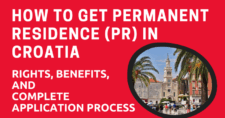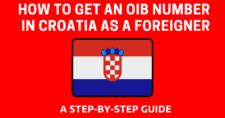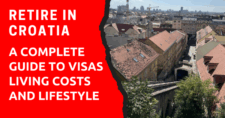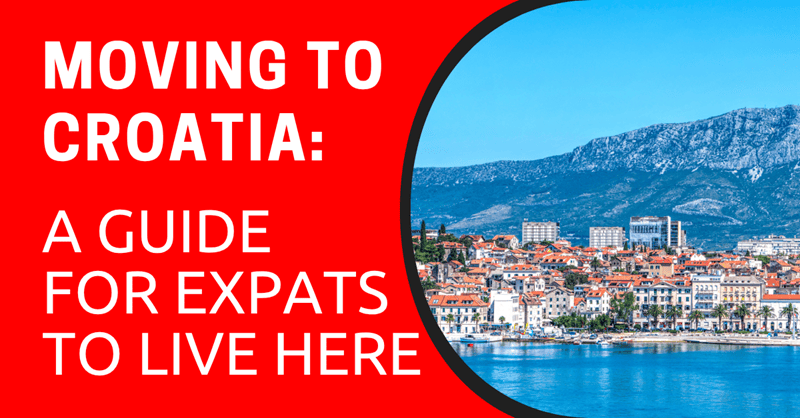
This article will take approximately 53 minutes to read. Don't have the time right now? No worries. Email the ad-free version of the article to yourself and read it later!
Your guide on moving to Croatia includes everything you need to know from visas, jobs, accommodation, the cost of living, to tips from real experiences.
Ever thought about moving to a European seaside town, living the slow life, sipping your morning coffee, and strolling to work with the sea and mountains as your backdrop?
In 2024, I had the opportunity to move and live in Split, Croatia, for a whole year, from June 2024 to May 2025. I worked as an administration and marketing manager for a small Thai restaurant in the city. This experience gave me a different perspective on Croatia beyond just visiting, like the lifestyle, work culture, bureaucracy, and running a business in a foreign country.
And what I’ve learned is that moving countries is not just about packing your bags and getting on a plane. It requires preparation and readiness in many aspects, from the visa application process, finding accommodation, and opening a bank account to the small stuff like buying a SIM card or navigating city transit. These are all things you need to know.
In this guide, I’ll introduce you to the things you should know before moving to Croatia, along with some handy tips from firsthand experience that will make your move to the country much easier and more comfortable.
Disclaimer: This article may include links to products or services offered by ExpatDen's partners, which give us commissions when you click on them. Although this may influence how they appear in the text, we only recommend solutions that we would use in your situation. Read more in our Advertising Disclosure.
Contents
- Visas in Croatia
- How to Apply for an OIB in Croatia
- What is an OIB?
- Job Hunting
- Cost of Living in Croatia
- Finding a Place to Live
- Utilities and Internet
- Opening a Bank Account
- Health
- Learning Croatian
- Food
- Croatian Food Culture
- Popular Cities for Expats
- Croatian Airports and Travel
- How to Get Around
- Croatian Society and Culture
- Do You Have to Pay Taxes if You Work in Croatia?
- How Difficult and Safe is it to Live in Croatia?
- Documents to Carry
- Timeline for Planning Your Move to Croatia
Visas in Croatia
First things first. If you’re planning to relocate to Croatia, sorting out your visa is the top priority. I’d recommend starting the process early, as it can take quite a while to secure a visa here.
Which Visas Allow Entry into Croatia?
Since 2023, Croatia has officially joined the Schengen Area, changing the visa process entirely. This affects tourists and those wishing to stay longer-term, like workers, digital nomads, students, or permanent residents who must now adhere to Schengen and EU rules.
When I applied for a work visa in mid-2024, I found that some steps had quietly changed. More documents were needed, which wasn’t complicated but involved a long wait time. Even though Croatia is part of the Schengen Area now, its bureaucratic system remains quite sluggish, requiring a lot of patience.
The main types of visas that expats use to enter Croatia include the following:
Tourist Visa (Short-Stay Visa Type C)
If you plan to come to Croatia for a short stay of no more than 90 days, whether for travel, visiting friends, or trying out the lifestyle before deciding to stay longer, you’ll need to apply for this tourist visa. It’s a basic visa for traveling within the Schengen Area, including Croatia.
Depending on where you’re from, you may need to apply for a visa in advance, just like going to other European countries such as France, Germany, or Italy. There is no visa-free access like some other European nations. The required documents are similar to a typical European visa application. Here’s what you need:
- Passport
- Proof of accommodation
- Invitation letter
- Travel insurance with at least €30,000 coverage
- Round-trip airline tickets
- Financial proof like a bank statement from the past three to six months
- The visa application with photo
The visa fee is approximately €80, or around US$90, which is the standard rate under the Schengen system. You can apply through the Croatian embassy or a designated visa application center, where you will need to book an appointment and submit documents yourself. The processing time is around 15 working days, so it is recommended to allow for at least one month in advance to avoid unnecessary delays.
Temporary Stay Visa
If you’re planning to stay in Croatia for more than 90 days, whether for work, study, being a digital nomad, or staying with a partner, you’ll need to apply for the Temporary Stay Visa.
In my case, I used this visa for work, where the employer had to submit documents to the government agency. The required documents included:
- Passport
- Employment contract
- Proof of accommodation
- Income evidence
- Health insurance
It took about six weeks for approval, and I also had to register my address with the local police within three days of arrival.
Aside from work like in my situation, if you’re coming for other reasons such as studying, living with a partner, or as a digital nomad planning to stay over 90 days, you’ll need this visa too.
The difference lies in the documents needed, which change depending on the purpose of your stay. For example, if you’re coming to study, you’ll need a letter of acceptance from the university, proof of finances, and student health insurance. Meanwhile, if you’re coming as a digital nomad, you’ll need to show proof of stable income and documentation that you work for a company outside Croatia. If you’re moving in with a partner, you’ll need documents that prove your relationship, marriage certificate, or evidence of cohabitation.
Overall, the main documents are still quite similar, such as a passport, health insurance, accommodation proof, and application forms. It’s just the finer details that change based on the visa’s purpose.
Permanent Residence Visa
If you’re planning to retire or live long-term in Croatia for over five years, you’ll need stable income, health insurance, and to pass a basic Croatian language exam. With this visa, life becomes much easier. You don’t have to renew your visa every year, you can work for any company, start your own business, or travel conveniently within the Schengen area.
What My Visa Application Experience was Like
From personal experience, I’d recommend being aware that Croatia’s bureaucratic system isn’t as quick or responsive as what I was used to in Thailand.
You’ll need a lot of patience and tolerance, especially when it comes to documents where almost everything requires the “original” and needs to be sent back and forth multiple times.
For example, in my case, applying for a Work and Stay Permit required documents with official signatures from both Thai and Croatian authorities. When applying in Thailand, it only took two days, but in Croatia, it took a full two months for approval and the stamped documents to be returned.
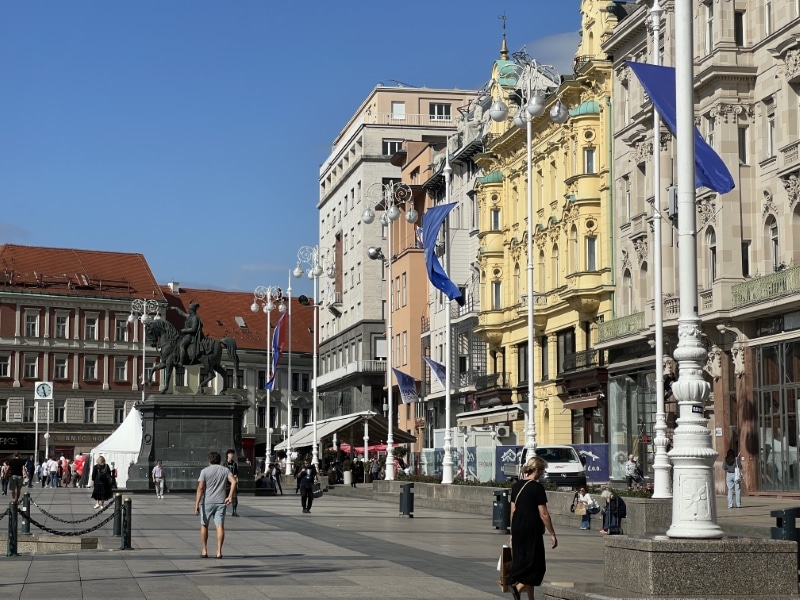
But that’s not all. After the documents had been approved by the Croatian side, they need to be sent back to Thailand to be signed by the Thai consulate.
Then they were forwarded to the Thai embassy in Hungary (since Croatia does not have a Thai embassy). Finally, all documents were sent back to the Croatian embassy in Malaysia, which is responsible for handling visa applications specifically for Thais.
However, if you’re an expat from another country, you’ll need to send your documents to the Croatian embassy nearest to your country, since Croatia doesn’t have embassies scattered around the world like larger countries. This makes the visa process a bit more roundabout and time-consuming than you might expect.
Once everything reaches Croatian officials in Malaysia, you’ll have to wait at least six weeks for the final review. Importantly, once the visa is approved, you must enter the country within 14 days.
From start to finish, it took me about six months exactly. It’s fair to say that anyone considering moving should start planning and getting their documents ready well in advance. Although the process may seem chaotic and slow, with good preparation and timeline planning, it can go much smoother without too much frustration.
How to Apply for an OIB in Croatia
After arriving in Croatia, the first thing you need to do is register your address with the local police within three days, as this is a legal requirement. If you’re staying in an Airbnb or renting long-term, the host will typically help you register or do it on your behalf. But if they don’t, the police might contact the landlord or your employer, which isn’t cause for alarm. Just show up at the office to confirm your identity in person.
What is an OIB?
Once you’ve verified your identity, if you plan to stay in Croatia for more than three months, whether to study, work, or start your own business, you’ll need a tax ID number called Osobni Identifikacijski Broj (OIB).
This number is essential for almost all transactions, from opening a bank account, paying utilities, receiving a salary, and registering your address to even buying some products online. In short, without an OIB, you can hardly do anything.
Normally, when you apply for a visa, you will receive a document from the embassy that includes your OIB number, which you will need to confirm upon arriving in Croatia.
Steps and Documents Needed for Obtaining an OIB
The process of applying for an OIB isn’t complicated. Just head over to the immigration office or tax office in your city. The officials will provide a form to fill out and request various identification documents, such as:
- Your original passport and a copy
- Proof of residence in Croatia (like a rental agreement or a certificate from the homeowner)
- Two color photos, approximately 3.5 x 4.5 cm in size
- Documents showing your purpose of stay, such as an offer letter from a company or proof of education
Tip: When you go, submit Form 16a, a certification from the police station, at the same time. This document will help you open a bank account immediately, saving you from having to queue up all over again.
When applying for the OIB at the immigration office at Split City Police Station, you can only contact them from 9:00 AM to 11:15 AM and 1:00 PM to 2:00 PM on Wednesdays and Fridays. The officers are pretty strict, so if you’re even a little late or haven’t prepared all the required documents, you might have to wait until the following week.
But if everything is in order, it takes no more than 30 minutes to fill out the form, have your fingerprints taken, and receive a small white paper with your OIB number along with a document called potvrda o uplati (payment receipt), which is red and green, to take home with you.
The final step is to take the red and green receipt documents and pay at a nearby post office. The fee is around €30-40. You will receive a stamp as proof of payment (cash stamp) that needs to be attached to the receipt as evidence.
After that, the officer will inform you to pick up the Personal Identification Number card (OIB card) after another 2 months. You must bring the small white paper document from the first time, along with two payment receipts, to receive the official OIB number document or ID Card. In everyday life, though, you can use a copy of the document or inform the officer of the OIB number when necessary, except when opening a bank account or dealing with government offices.
Job Hunting
If you’re trying to find work in Croatia, let’s take a look at some jobs that expats usually enjoy doing.
What Are the Best Jobs in Croatia?
Most Croatians live seasonally, especially in tourist cities like Split or Dubrovnik. Summer is the golden time for work as the whole city buzzes with tourists, while winter is for relaxing.
Many shops close for renovations, boats stop running, and some businesses take long breaks, almost like hibernation waiting for summer to return. It’s a true European way of life.
One thing many people might not know is that quite a few Croatians choose to leave the country during winter. Young professionals, in particular, often move to work in countries like Germany, Austria, or Italy because these places offer better benefits and significantly higher salaries. But the cost of living there is also higher.
A friend of mine told me about his friend who permanently moved to Germany because even though the work was just as tough, the pay was almost double. Although the living expenses were a bit higher, he was happier working for a major global company than in a service job in Croatia.
For me, Croatia is more open to the expat job market than other countries in Europe. It’s easy to find a job without needing to fuss over language documents or certifications. It’s perfect for those wanting a change of scenery for a while or those on a gap year not too focused on stability.
It’s ideal for those who want to work and travel, enjoying life by the sea with great sunshine, fresh seafood, cheap beer, and meeting people from all over the world.
If you want to find a job in Croatia, you need to be there between May and September, the high season, when the service industry is booming. Just walking down the street, you’ll spot “Now Hiring” signs everywhere: restaurants, hotels, bars, cafes, boat rental shops, tour companies, you name it.
Or, if you prefer doing things online, check out LinkedIn, Glassdoor, or Facebook groups like Expats in Croatia or Expats in Zagreb. You’ll find tons of openings, from servers and bartenders to boat crew and tour guides.
If you speak fluent English or have boating skills, you’ll have a clear edge and better-than-average pay too. Most of these gigs are short-term contracts, usually just three to six months. So, don’t expect bonuses or fancy benefits, but it’s a great way to earn decent money while enjoying the country at the same time.
Working with Croatians
If you want to work and party at the same time, I suggest choosing your workplace carefully. Working with Croatians in a local business or government agency might not live up to your expectations because the European style tends to be pretty quiet, with everyone doing their own thing.
There’s not much small talk, everything runs on schedule, and everyone goes their separate ways after work. But if you work in the service sector, like bars, restaurants, or tour companies, the atmosphere is much more fun and warmer, filled with expats living short-term just like you.
For example, my friend who works at a tour company in Dubrovnik says the work atmosphere is like a big group project with friends from all over the world. Everyone helps each other out, chats about everything, and practices English every day.
Finding Stable Work All Year Round
If you’re looking for a stable job available year-round, Croatia offers some interesting career paths, especially in for programmers, data analysts, or IT support.
In the capital, Zagreb, tech startups are popping up more and more. Even though I don’t work in tech myself, from what I’ve seen on LinkedIn groups or communities in Croatia, many companies hire expats and offer remote work opportunities. The average salary ranges from €1,500 to €3,000 per month, depending on the job and experience.
Another avenue is the healthcare system. Doctors, nurses, and pharmacists are positions still in demand in many areas. If you have comparable qualifications and a B2 level in Croatian, you have a good chance of getting a job in this field. The average income is about €1,200 to €2,500 per month, and it’s available year-round.
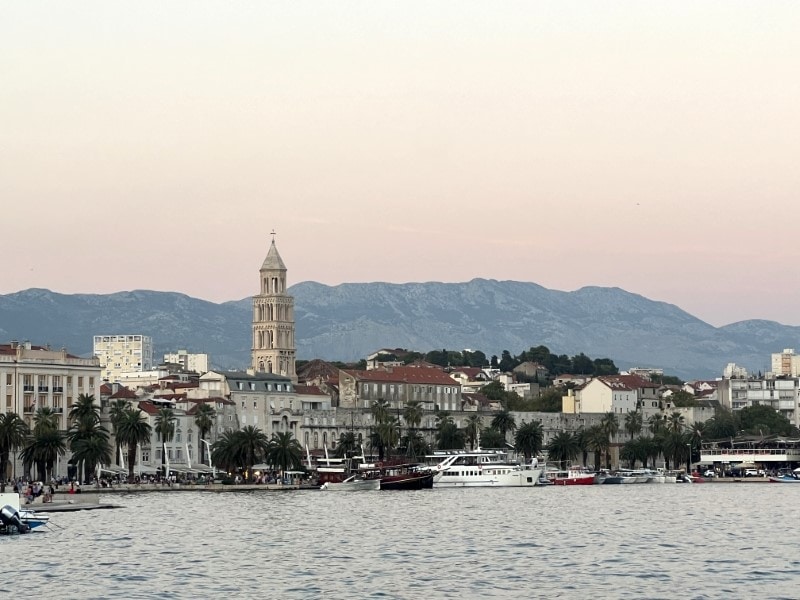
The last field to mention is skilled labor, like electricians, carpenters, builders, and plasterers, with jobs available all year. Especially in winter, when every business is doing renovations, rushing to finish work before summer arrives. The average wage is €10 to €25 per hour, depending on skills. High qualifications aren’t necessary; being diligent and having experience is what matters.
Overall, Croatia is a fun place to work. If you’re looking for that easy-going European seaside vibe where you can take your time, practice languages, meet people from around the world, and balance some work with relaxation, then this is a great starting point.
Cost of Living in Croatia
If you’re not living extravagantly, the cost of living for a single individual generally starts at around €550 to €900 per month, depending on the city and personal lifestyle. Major expenses such as accommodation, food, transportation, and personal items are still within reach, especially if you cook at home and choose to buy from supermarkets rather than tourist-focused markets.
If you’re planning to move alone for a summer job to save some money, many companies there provide benefits like meals, accommodation, and travel allowances. Some even offer free housing.
For instance, my Thai friend worked at a resort on an island near Split. He worked as a cleaner and got free meals every day, free accommodation on the island, and didn’t need to travel far, so he barely spent any money during workdays. He only used money when exploring other islands on his days off. I used to work at a Thai restaurant in Croatia, where I also got free Thai meals every day, which helped save a lot on expenses.
If you’re looking for in-depth details about the cost of living in each city, along with various budget-saving tips, check out ExpatDen’s guide to the cost of living in Croatia.
Finding a Place to Live
There are several things to know about finding a place to live in Croatia, and it varies greatly depending on the season.
Cost and Availability
If you’re planning to move to Croatia, whether short-term or long-term, accommodation is something you should prepare for in advance. This is especially true if you come during the summer because you’ll need accommodation documents for visa applications, and good places tend to get booked quickly. Plus, prices tend to rise in nearly every city.
When I lived there, I noticed many people chose to rent one-bedroom or two-bedroom apartments in the suburbs because they were much cheaper than in the city. Plus, they offered a decent amount of space and aren’t as cramped as the old studio apartments in town.
Some people opting for city center living could find themselves paying as much as €2,000 to €3,000 for old studios in the summer, but in winter, prices could drop to around €500.
For instance, when I was in Split, during the summer I rented a two-bedroom apartment in the outskirts for about €900 a month, excluding utilities. But in winter, the same place went down to around €500, with all utilities included, which saved quite a bit of money.
Recommended House-Hunting Websites
If you’re looking for affordable housing, like what locals live in, I recommend primarily using the Njuskalo, as the website offers plenty of options at better prices than Airbnb or Booking.com. You might also find some rental homes in the same Facebook groups where you look for jobs. And there are a lot to choose from.
Rental Agreements
One thing to really watch out for is short-term rental agreements. Some landlords won’t offer long-term leases during the summer because they’re saving the place for Airbnb or daily rentals, making long-term accommodation harder to find and more expensive.
Also, some listed prices don’t include utilities, such as electricity and water, or even wifi. You also need to check if there’s parking available, as some places don’t have any, which could be inconvenient if you own a car.
Another important thing is that some landlords might not provide a residency confirmation document, meaning you won’t be able to apply for a long-term visa or handle other official matters. So, if you plan to stay in Croatia long-term, ask for a clear and complete official rental agreement to avoid any issues when dealing with important matters.
Utilities and Internet
While living in Croatia, you can’t escape the monthly basics like water, electricity, garbage disposal, and internet. Altogether, it costs about €50 to €100 per month, depending on your lifestyle. Paying is super easy too. Some people pay directly to their landlord or scan their bills and pay through a banking app. It’s as simple as in Thailand.
The internet here is fast, stable, and widely accessible. Whether you’re in a big city or a rural area, you can enjoy TikTok, YouTube, or video calls smoothly and without interruptions. However, there are some things to watch out for, especially if you’re living near the airport. Mobile signals can be unstable when planes are landing or taking off. At my first house near Split Airport, mobile internet was completely unusable during takeoff. Fortunately, the landlord provided wifi, which worked perfectly, so it wasn’t much of an issue.
For mobile carriers, there are three main providers:
- Hrvatski Telekom (T-Mobile)
- A1
- Telemach
Each offers a variety of plans, including both monthly and prepaid options, with prices starting around €10 to €20 per month depending on data and call minutes. I use A1’s 10GB package, which costs about €9.99 per month. It works smoothly and I’ve never had any issues.
I prefer prepaid because there’s no hassle of signing contracts, you top up as needed, it’s easy to manage expenses, and if you’re not staying in the country long, you can cancel it without throwing money away on a monthly contract.
If you’re new to Croatia, you might want to start with a prepaid SIM. It gives you the flexibility to change your mind later or switch carriers easily, with no commitments.
Tip: If you work online every day, make sure to clarify wifi details with your landlord before renting so you don’t miss important meetings due to unexpected internet outages.
Opening a Bank Account
If you already have a bank account in Europe or the US, like with Revolut, Wise, or N26, you can use it for almost everything in Croatia, including card payments, receiving money, and transferring funds. But if you’re planning to work, receive a salary, or register a business in the country, having a bank account in Croatia is better for convenience and to avoid bank fees.
Most expats often use banks like Zagrebacka Banka, Privredna Banka Zagreb (PBZ), Erste Bank, and the one I chose to use is OTP Banka. It’s easy to deal with, user-friendly, has many branches, and offers an app in English.
To open a bank account, you need:
- A passport and an OIB, which you can obtain from the local tax office.
- Proof of residence in Croatia, like a lease agreement or a certificate from the accommodation owner.
- A small account opening fee, about €0.99 only.
In my experience, when opening an account with OTP Banka, I needed to prepare more documents than I initially thought. The bank requested:
- Employment contract
- Phone number in Croatia (though if you don’t have one yet, you can use your number first and update it later)
- Email for contact
- Residence certificate from the police station (form 16a)
Recommendation: You can request the form 16a when applying for the OIB, and it typically takes about a month to receive the actual document. After that, if you wish to use the banking app, you must inform the staff to specifically enable it for you, as the app requires identity verification through the bank. Once all documents are in order, you will have to wait another two weeks to receive a package from the bank, which is used for identity verification to begin using various systems.
Health
Expats here primarily rely on the public health insurance system or private health insurance when they need to see a doctor.
Is the Healthcare System in Croatia Reliable
One thing many people worry about when moving abroad is “What if I get sick?” But when I actually moved to Croatia, I found that the healthcare system here is quite decent, both in terms of access to services and quality of care, not much different from my home country of Thailand. There are state hospitals, private clinics, and pharmacies available almost on every corner of the city.
State Health Insurance System (HZZO)
At the company where I used to work, everyone could easily access healthcare because each person had HZZO (Croatian Health Insurance Fund) provided by the company, and some had additional insurance on their own. When visiting a hospital or clinic, you simply show your OIB or passport, or some people might even receive the HZZO card (the blue one) in the mail, making it even more convenient.
But there’s a catch: if you use the state health insurance system (HZZO) for treating a chronic condition that isn’t an emergency, you’ll need to have a designated doctor first. You have to register and choose a general practitioner (GP) before you can get routine care, like general checkups, referrals to specialists, or prescriptions.
If, however, you need continuous non-emergency care like annual checkups or have chronic conditions, you also need to register with a GP. This doctor will be your main point of contact in the HZZO system, handling initial consultations, referrals to specialists, or issuing prescriptions.
Dom Zdravlja (Community Health Center)
For unexpected illnesses, Croatia has Dom Zdravlja (Community Health Centers) located everywhere. You can walk-in to see a doctor if the condition is not severe. In emergencies like chest pain, dizziness, or unconsciousness, you can call 112 (available for ambulance, police, and rescue services) immediately without any charge, unlike in the United States.
Private Health Insurance
If you have private health insurance, you can use private clinics without needing a family doctor, which is super convenient. No long waits. But you might pay a little more. Doctor consultation fees start at around €40 to €100, depending on the place. If extra tests are needed, like an ultrasound, blood tests, or X-rays, the costs will increase accordingly.
Essential Medicines
For small issues like paracetamol, allergy meds, or tummy ache remedies, you can easily buy them at pharmacies (look for signs saying ljekarna in green) without a prescription. But controlled drugs or antibiotics still require a doctor’s prescription as usual. Most staff can speak some English, or just explain your symptoms, and the pharmacist will provide suitable medications.
Basically, if you’ve registered properly and have the right health insurance for yourself, living in Croatia will be pretty smooth, even if you encounter unexpected situations.
Is Health Insurance Necessary
Having health insurance in Croatia isn’t just an option, it’s a necessity, especially if you plan to stay longer than three months. Generally, if you enter the country legally and complete the registration process as required by the state, you’ll have the right to the state health insurance system immediately. That’s the HZZO, which is the mandatory insurance system.
Back then, I paid around €70 per month for HZZO. Even though I never used it, it felt safer to have. When you do get treatment, there’s a small extra cost of about €1.32 each time, known as a co-payment. In some cases, there might be additional costs, like for specialist consultations or medicines not covered by HZZO.
But if you find yourself sick often, have chronic conditions, or worry about expenses, it’s a good idea to get supplemental health insurance. It covers the co-payments and sometimes other special services, like in-depth health checkups, specialist visits without needing a GP referral, and treatments at private clinics.
The cost of supplemental health insurance ranges from €10 to €40 per month, depending on the coverage. It might seem like a small added expense, but it’s well worth it for the peace of mind and ease of access to medical services without the worry of medical bills.
Learning Croatian
Croatia has its own language, and living here might require picking up some local language skills to make settling in easier.
Is it Necessary to Learn Croatian?
Many might think that because Croatia is in Europe, everyone would speak English or French. But actually, people here primarily use Croatian, known as Hrvatski. Croatia joined the Schengen Area, and the younger generation is learning English more and speaking it better. But there are still a lot of older folks who don’t speak English in general.
Sometimes when you go shopping at convenience stores, you might encounter older staff who don’t feel like speaking to you. Or if you go to a local restaurant, most of the time there isn’t a picture menu, so you’ll have to rely on a translation app. Hence, if you know a bit of Croatian, you’ll have an advantage and life will be much easier.
I think the structure and accent of Croatian are a bit different from Thai or English, but it’s not too difficult. We start with simple words, like daily greetings such as dobar dan which means hello, hvala meaning thank you, and molim which is used for please or you’re welcome. Basic words like numbers, days of the week, or names of dishes are enough for everyday life.
Every morning, when I walk past the houses of the neighbors I know, I usually greet them with dobar dan and a smile. They warmly reply and ask, “Kako ste?” which means “How are you?” The conversation mostly continues in English with simple phrases like “I’m good” or others that Croatians generally understand.
If you’re not planning on a long-term stay or applying for permanent residency, using English in your daily life should be sufficient. Especially in cities like Split, Dubrovnik, and Zagreb where the younger generation has a decent grasp of English.
But if you plan to apply for permanent residency or Croatian citizenship, a key condition is passing a Croatian language proficiency test at a minimum level of A2 or B1, depending on the type of visa or status you are applying for.
How I Learned Croatian
I learned Croatian starting with watching tutorial clips on YouTube, like the channel Learn Croatian, which explains vocabulary and daily conversations in an easy-to-understand way. Or I used the Duolingo app, which offers basic lessons for regular speaking practice. This is perfect for beginners without any prior knowledge.
If you’re serious about learning more, you can enroll in online courses, available both for free and paid. Most paid courses range from €20 to €50 per month, depending on the platform and the intensity level of the lessons.
Apart from online learning, whenever I come across new vocabulary or phrases I want to learn, I usually ask my local neighbors. Even just a few small words help me gain confidence in speaking, and I also get to learn local accents and idioms, fostering a relationship with my neighbors as well.
Food
The first thing I fell in love with shortly after moving to Croatia was the fresh ingredients that are so easy to find, especially olive oil, which is the star of every dish. Back in Thailand, it’s expensive and hard to come by, but here, you can find it just a few hundred meters away. Some shops sell it by the liter straight from local farms, and the price and quality are shockingly good. I’ve tried eating it with plain bread, and it makes life feel great because of this olive oil.
Morning markets, especially in coastal cities like Split or Dubrovnik, are filled with seasonal fresh produce, from fish straight from the sea to fresh vegetables and fruits from the garden. Although prices are higher than in supermarkets, you can be assured of fresh goods every day. There’s also freshly baked bread from local bakeries found across the city. The bread here is different from typical European bread because it has a particularly soft and fluffy texture, unlike the usual hard European bread. As a Thai person who doesn’t usually like bread, I was quickly converted to a bread lover because it’s easy to eat and incredibly delicious.
And let’s not even get started on big supermarkets like Tommy, Lidl, or Konzum, which have everything from cheese and wine to ready-to-eat meals. Sometimes you even find good quality wine reduced to just €10. No wonder people here are big fans of wine.
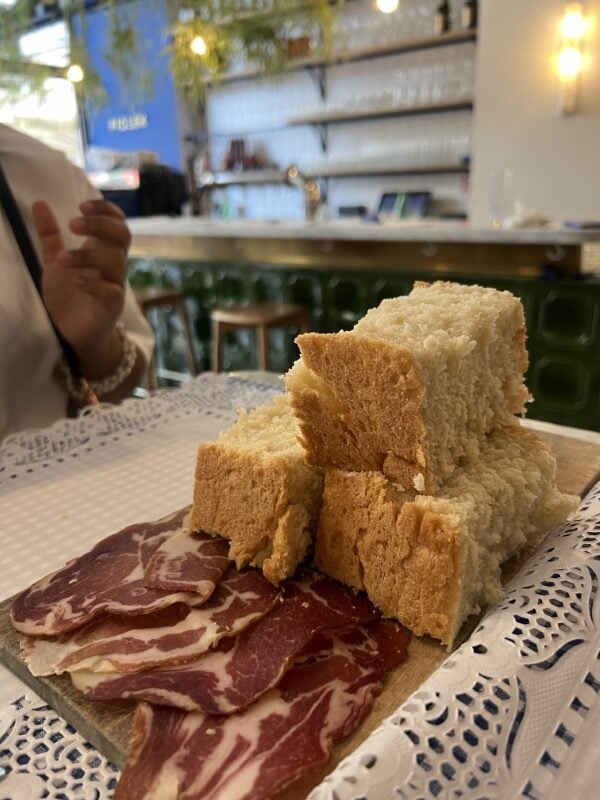
Just a little hint that Croatian food is super salty. It’s influenced by various cultures, including Italian, Hungarian, Turkish, and Balkan. For us Thais, who are used to fiery yet well-rounded flavors, it might seem a bit bland.
Often, it feels either overwhelmingly salty or completely plain, making you think just a pinch of MSG might make this better. But that’s the local dining culture here. So if you bring your own seasonings to a party, Croatians don’t really mind.
Some local favorites that I’ve tried almost all of include:
- Cevapi: A popular dish available in every supermarket and restaurant. It’s seasoned minced meat sausages grilled over charcoal, served with flatbread and onions. It’s similar to the Isan-style sausages from home and could be a good substitute.
- Peka: A dish of meat or fish with vegetables baked in a clay pot buried in coals. The meat or fish and veggies are baked for several hours under hot coals. It has a deep, smoky flavor that’s truly delicious, though it might start to taste too salty after a while.
- Sarma: Another classic dish, featuring cabbage leaves stuffed with minced pork and rice, simmered in tomato sauce. It’s heartwarming with a mellow flavor, perfect for cold weather. Personally, it’s not my all-time favorite, but it’s quite easy to enjoy.
- Black risotto: A deeply black squid ink risotto, with a full-on sea aroma and flavor. It’s a dish that might not be too foreign to Thai people because it has started appearing in Italian restaurants in Thailand. But this is the original version, richer and more intense. Perfect for those wanting to try something new or who love seafood.
- Pasticada: My favorite dish, a slow-cooked beef stew simmered until tender in a sweet and sour sauce, served with gnocchi (Italian dumpling-like pasta). If you find a good place where the beef has no strong smell, it’s definitely worth ordering again.
Croatian Food Culture
The dining culture here is quite different from back home. Every meal emphasizes taking it slow and being together. Especially on Sundays, lunch feels like a family gathering. Everyone sits down to eat, chat, and sip wine for almost the entire afternoon. The type of wine changes with the seasons: red wine in summer or mulled wine in winter. It’s often served with bread and olive oil. It’s truly warming for both the stomach and the heart.
Something that us Thais need to adjust to a bit is that meals here are typically served course-by-course, not as a single dish like back home. For example, if you order a steak, you just get the meat. If you want salad or potatoes, you have to order them separately. This means that sometimes, eating out requires a bit of restraint.
Tip: if you want to fill up without breaking the bank, try ordering the special lunch menu called marenda (daily menu). It’s only served at noon and costs around €6 to €10. You’ll get a small soup, a main course, and a little dessert. Some places are really generous with portions, much like the delicious, affordable made-to-order meals in Thailand. You can even save leftovers for another meal.
If you’re invited to someone’s home for a meal, don’t fill up beforehand. Folks here serve up a feast. And if you ask for seconds, the Croatians will be delighted. It’s considered a form of expressing love.
Popular Cities for Expats
Each Croatian city offers its own unique charm. Some are quiet and perfect for work, some are relaxed and ideal for unwinding, while others are lively and full of color, great for socializing and meeting new people. And when it comes to the most popular cities among expats, Zagreb, Split, and Dubrovnik are definitely at the top of the list.
Zagreb for Nightlife Lovers
The Croatian capital city that has everything. It’s ideal for those who love city life, stable jobs, and vibrant nightlife. Here you can find both permanent and remote jobs, with a touch of Western Europe, but a lower cost of living compared to Germany or Austria.
Shared rooms cost around €250 to €400 per month, typical lunch costs €6 to €10, and there are trendy cafes, trams across the city, bookstores, weekend markets, and multinational companies to work for. On days off, just hop on a tram to sip coffee, visit parks, cycle, or enjoy live music in the city. It gives off a lively vibe without being too hectic.
Split for Vacation Lovers
This is the city where I live, and I dare say it’s being on vacation every day. With beautiful views, good weather, and friendly people, it’s perfect for those who want to slow down, enjoy morning coffee before starting work, and gaze at the sparkling sea both morning and evening.
If you’re working remotely, in a creative field, or looking to escape the hustle and bustle of a big city, this is the place for you. Or if you’re seeking a service job working on the islands to escape the chaos, I highly recommend it. Even students looking for a university will find well-known universities to choose from in Split.
While the public transportation system may not be as convenient as in the capital, the city is easily walkable and has a pleasant atmosphere. The cost of living is slightly higher than Zagreb. For instance, shared rooms start at around €300 to €450 per month. If you’re renting a private apartment alone, it’s about €900, but if you have someone to share with, it’s much more affordable.
Dubrovnik for Party Lovers
If you love taking photos, exploring old towns, or are into art and romance, you’ll easily fall in love with this place. Every corner looks like a movie set, with medieval walls, golden cobblestone streets, and the most premium sea views in Croatia. But it also has the highest cost of living in the country, especially in the old town area. Shared room rentals start around €400 to €600 per month. Most restaurants cater to tourists and are quite pricey, but if you venture deeper into the local areas, you can find some places with better prices. It’s perfect for those who want to be surrounded by beauty and culture.
If you love the social life, parties, or work in the tourism industry, you’ll have a blast during the summer because the city is bustling day and night. Shops stay open late, and there are lots of events. But once winter sets in, many shops take a break, and the city noticeably quiets down with heavy rainstorms. So, if you’re only free during the summer, this place is just what you need.
Croatian Airports and Travel
Traveling to Croatia is a breeze because it’s close to Austria, Italy, and Germany, which have many direct flights to Croatia. The main airport people use is Franjo Tuđman International Airport (Zagreb Airport) in the capital Zagreb. It’s the largest airport in the country with direct flights from major European cities like Vienna, Amsterdam, Munich, Istanbul, and more, making layovers super convenient.
If you’re focusing on living in coastal cities like Split or Dubrovnik, there are international airports that you can fly directly into, such as Split Airport and Dubrovnik Airport. Especially during the summer, there are more direct flights from Europe, so you won’t need lengthy transfers. But tickets might be pricier if you book closer to your travel date. Flights from Germany take about two hours, and from Italy, it takes only about one hour.
When I was there, I flew to Rome, Germany, and Austria, which was very convenient because flying within the Schengen Area doesn’t require a visa. If you have an OIB card, you don’t need to carry your passport all the time, but it’s a good idea to keep it with you. There are options for both low-cost carriers and main airlines, such as Eurowings, Austrian Airlines, Croatian Airlines, making it easier to choose according to your budget and convenience.
How to Get Around
Getting around in Croatia is convenient, with plenty of travel options available.
Buses and Trams
For getting around in Croatia, I recommend using buses, as there are several private companies like FlixBus, Arriva, and Promet known for their good service, punctuality, and affordable prices. Buses stop at many places in both large and small cities, making travel very convenient.
Each Croatian city has its own transportation system. For example, Zagreb has an extensive tram network covering the city, while Split primarily relies on buses. Moreover, in Zagreb, there are buses for traveling between different districts or from the airport to the city center, with shuttle buses available every hour. But Split doesn’t have this service even though it is well connected with bus stops instead.
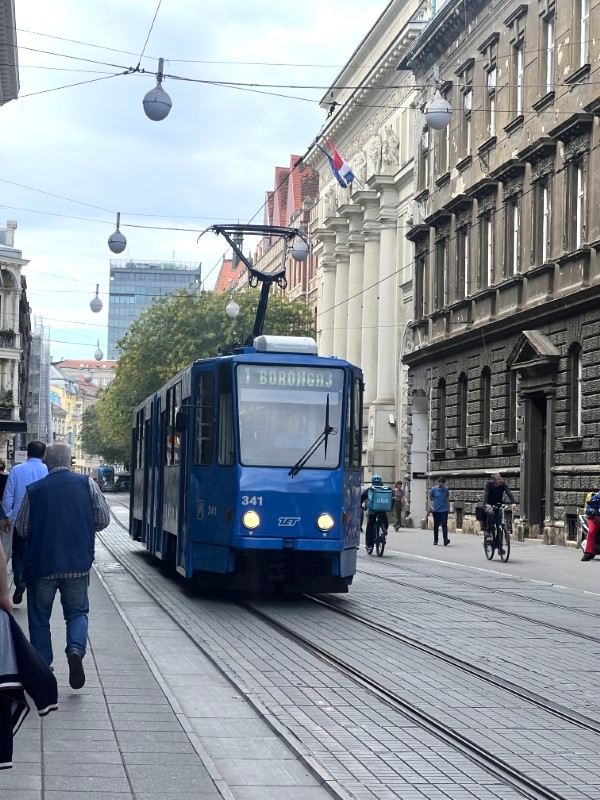
In Zagreb, tram or bus fares start at about €0.53 for a one-way trip. If you use them frequently, you can get a monthly pass for around €50, which is great for those staying long-term and who regularly use public transport.
In smaller cities like Split or Dubrovnik, there are no trams, but local buses are the main mode of transport. They run every 20 to 30 minutes during the day. Tickets cost about €1 to €2 per trip if bought in advance, but approximately €3.50 if purchased from the driver.
For those planning to stay permanently, it’s advisable to get a bus card to cut costs. Even though it doesn’t have a monthly system like in the capital, it’s better than buying single trips. Sometimes, buying through the app can cause issues like app crashes, internet drops, or crowds that make it hard to access the ticket scanner. You might worry about ticket inspectors boarding, but with a bus card, you don’t need to scan; you can just hop on the bus. It’s much more convenient and less stressful.
Trains
The train network covers major routes between big cities like Zagreb and Rijeka or Zagreb and Osijek, but services are less frequent and slower than buses. Although there are routes to Split or Dubrovnik, services are quite limited, with only two to three trips per week, or none at all during winter. Train travel is often inconvenient and time-consuming, so traveling by bus is much more convenient and flexible.
Boats
If you’re in a coastal city and want to visit the islands, there are ferry services from various ports, like from Split to the islands of Hvar, Brac, or Vis. Fares start from €5 to €10, depending on the distance and type of boat. There are also longer ferry routes, such as from Split to Italy, which takes about 14 hours. For those who love adventurous travel, this city truly offers vibrant travel options.
Croatian Society and Culture
From what I’ve experienced and observed, most Croatians are friendly, place a high value on family and community, and take great pride in their culture. Since the country went through a war not too long ago, there’s a strong sense of nationalism here, and people place importance on religion and their historical roots. It’s quite common to see children named after national warriors, such as Ante or Ivan, which you’ll find in almost every family, or after famous ports like Marina or Tina, which are also frequent.
Though Croatians may not be very open or casual in conversations, especially with Asian folks who seem unfamiliar. But once you get to know them, most are friendly, kind, and willing to help. Some of my neighbors love to bring Croatian food over for me to try, along with sharing their pride in their local dishes, offering recipes, cooking methods, and sincere advice on how to eat them.
And every morning, the coffee ritual is a must. It’s like a daily ceremony. Each morning, they sit down, sip coffee, and chat a bit. Let’s just say it can take about three hours before they’re done with coffee and ready to start their day.
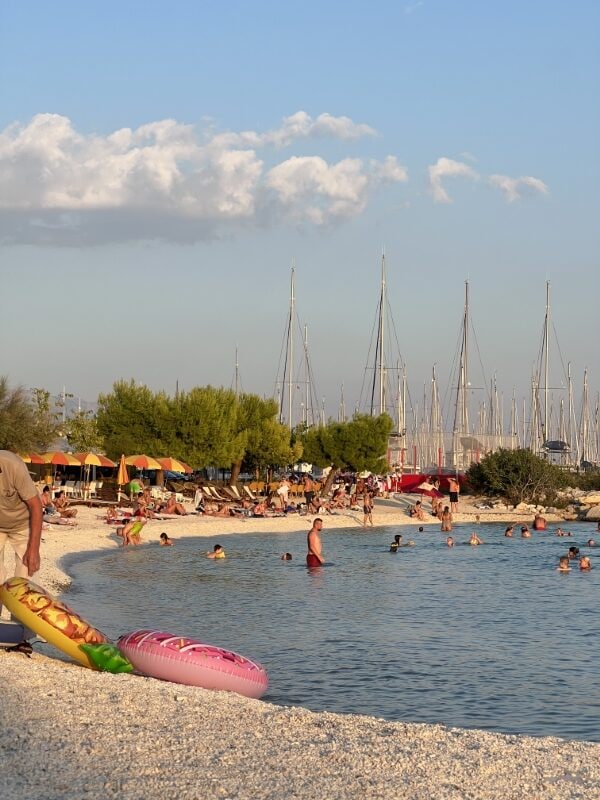
Another thing Croatians are absolutely crazy about is football (soccer). On match days, it feels like the whole country comes to a standstill. Everyone huddles up to watch the game, and bars with big screens are packed with cheers. If Croatia wins, get ready for fireworks, big and small ones. It’s a national celebration, no doubt about it.
As far as racism, I haven’t experienced it from Croatians. Sometimes, small kids might say things like “ni hao” or “konnichiwa” (hello in Chinese and Japanese, respectively) but it usually seems like they just want to chat rather than being racist.
What I’ve found to be actually more prejudiced often comes from tourists of other nationalities, like English or Swedish people who moved here because the cost of living is much lower than back home. Sometimes they can show subtle forms of racism or make you feel out of place unnecessarily. Occasionally, I’ve encountered tourists from East Asia who look down on fellow Asians, but I don’t take it to heart too much, as it’s usually people I meet only once.
Croatians are generally straightforward and say things as they are. If they are unhappy, they’ll tell you. Sometimes it might even end in a punch-up, with apologies following later. But in day-to-day life, Croatians are pretty laid-back, not overly fixated on time, and while work doesn’t have to be perfect, as long as it’s done well, it’s all good.
If you show sincerity and respect toward them, you’ll definitely experience the warmth of this society. And that’s what makes me feel that living here isn’t hard at all if we understand their way of life and adapt to the society and environment.
Do You Have to Pay Taxes if You Work in Croatia?
I’m lucky because my company takes care of all my taxes for me, and there’s an accounting office that handles everything, so I don’t have to stress about filing taxes myself. But for anyone planning to move to Croatia, whether it’s for studying, working, starting a business, or becoming a digital nomad, you should know that the tax system here is quite strict.
Everyone who earns income in the country is required by law to pay taxes. Basically, if money hits your Croatian account without a clear source, even around €1,000, and it matches the name of a local company or employer, whether it’s a salary, freelance income, or some kind of payment, there’s a good chance that the bank will call you to set up a meeting or pass the information to the tax department. This is because the system is quite cautious about money laundering and hidden taxes.
It’s pretty straightforward. When looking for a job or chatting with potential employers, make sure to clearly ask if the company handles your tax deductions and submissions. It’s a good idea to get this agreement in writing. If they take care of it, that’s great. Less hassle for you. But if they don’t, you’ll need to prepare to manage your taxes all by yourself.
The tax structure here is similar to Thailand’s, with a tiered system. The first portion of income is taxed at 20 percent. If it exceeds a set threshold, the rate rises to 30 percent. This doesn’t include social security contributions that both employers and employees must pay. Altogether, taxes and social security can amount to 30 to 40 percent of your income. In exchange, you get access to health benefits, medical care, and basic welfare in the country.
For digital nomads or small business owners, the process can be a bit more complicated as you’ll need to register as a taxpayer. If your income exceeds the limit, you might also have to file for VAT. It’s best to consult a tax expert who understands Croatia’s system, as some parts can be tricky for expats. Having an expert who speaks Croatian can make your life a lot easier.
The good thing is, Croatia has double tax treaties with many countries. This means if you’ve filed your taxes in Croatia, you won’t need to file again in your home country. That said, you must report and manage your documents correctly. Likewise, if you’ve paid taxes in your home country, you probably won’t need to pay again in Croatia.
How Difficult and Safe is it to Live in Croatia?
Overall, Croatia is considered one of the safest countries in Europe. Compared to major Western European cities like Berlin, Brussels, or Paris, where pickpocketing is almost a daily news, Croatia feels much more peaceful, allowing you to relax without constantly looking over your shoulder.
When I was in Split and had traveled to Dubrovnik, Rijeka, and Sibenik, I can tell you that strolling through the town was super chill. Whether it’s leaving your bags on the beach or walking home alone at night, there’s no need to carry pepper spray or be overly paranoid.
You can travel with peace of mind. Even on regular days when you forget to close the doors or windows, there’s no need to worry. Most people in the community know each other, and any strangers or suspicious behavior gets noticed immediately. Many homes don’t even bother closing their gates during the day because people respect and help each other a lot.
But when it comes to Zagreb, be a little more cautious. Since it’s bustling and has that city vibe, especially in tourist areas, train stations, or trams in the evenings, there might be some pickpockets. Still, it’s not as intimidating as in some other countries. Like when I was in Germany and Brussels, I had to clutch my bag and keep my phone close all day. But in Croatia, you can stroll around with your phone out and not feel tense at all.
Transportation and Taxis
If you’re planning to use public transportation or taxis in Croatia, it’s recommended to use ride-hailing apps like Bolt or Uber, as they are more convenient and safer. Locals also frequently use these apps, so you don’t have to worry about getting scammed. Booking a ride through apps is common and safe here.
Although regular taxis are still available, you might encounter slightly inflated prices, especially in tourist spots. If you need to hail a taxi on the street, make sure to choose one with clear registration and insist on using the meter.
Winter Precautions
During the winter, Croatia becomes noticeably quieter as it’s the low season. Many lose their jobs, income decreases, and you might occasionally run into drunk people or the homeless wandering through towns.
Generally, they don’t do much other than being loud or asking for money in odd ways. It’s best to avoid walking alone in desolate areas at night and make sure your doors are more securely locked.
The worst incident I’ve heard from someone close to me was when a Thai restaurant in Trogir was vandalized, with its window smashed, cash and tablets stolen, and insults sprayed on the walls. This stemmed from a conflict between the restaurant owner and Croatian staff. It’s a clear example of how stress from unemployment and lack of money can lead to drastic actions during this season.
Other Precautions
Croatians aren’t fond of people who are out-of-control drunk. Try to avoid drinking excessively in public and behaving inappropriately, as it could lead to police trouble or unnecessary issues. This is especially true if you’re an Asian expat in a small community with a distinctive appearance, as rumors could spread and some bars might stop serving you.
Also, don’t litter in public places because Croatians value cleanliness and social etiquette highly. It’s something to respect. If you dump trash secretly at night, neighbors will likely notice, and soon enough, you might receive a fine at your home.
Documents to Carry
The most important thing is to have your documents ready and keep them with you at all times, as this will make living and handling transactions much smoother.
For me, the main document to have is the OIB card, which is enough to live comfortably. If you’re driving, carry your international driver’s license along with your passport. But if you don’t have an OIB, it’s best to always keep your passport with you.
Another tip is to keep digital copies of important documents, like in your email or a file storage app on your phone, just in case of emergencies. This includes your work permit or employment contract that clearly states the company’s name and OIB.
When I flew to Austria, which is also in the Schengen area, the police asked to see my OIB and passport, and they wanted to see my employment contract to confirm I wasn’t working illegally. Luckily, I had scanned it and kept it on my phone, so I could easily show it to the officer. I also had a return flight ticket to my country as evidence, and the officer checked everything and let me through without any hassle.
Ever been pulled over by the police while driving? That day, I had my international driving permit but not my passport because it was sent to the Thai embassy for documentation. I only had my OIB with me. I explained the situation to the officer, who understood, gave a small smile, and said, “If you have an OIB, it’s fine.” So, if you’re not breaking any laws and have good intentions, you really don’t need to worry about living in Croatia.
Timeline for Planning Your Move to Croatia
From my experience, moving to Croatia isn’t something that happens overnight. It’s a process that requires at least six months to a year of planning, since their bureaucracy can be quite slow, with a lot of paperwork and steps involved.
Three to Six Months Before Moving
I started by researching information about the country, covering everything from the cost of living, accommodation, healthcare system, work culture, immigration laws, and weather. I wanted to see if I could adapt and, importantly, find a company that could handle my visa and work permit. Without employer support for these documents, it’s quite difficult to arrange it all by yourself.
Once I had a company willing to hire me, I started preparing my own documents, like my passport, a criminal background certificate from Thailand, and a draft employment contract. Other documents, like application forms, visas, or work permits, were managed entirely by my Croatian employer. After that, it was just a matter of waiting for the email with the visa results.
Lately, I’ve been taking the time to learn Croatian and brush up on my English. Even though no test scores are needed to work here, being able to communicate a bit makes the initial period much easier.
One to Two Months Before Moving
I started looking for a place to stay in Croatia, which needed to be done fairly quickly as rentals are hard to find, especially in popular cities like Zagreb or Split. Communicate clearly with landlords or agencies and secure a lease in advance. Having a place ready before arriving helps make registration much smoother.
The Week Before Moving
Once your visa is approved, book your airline tickets right away and get everything ready. Double-check your documents to make sure you haven’t forgotten anything. Say goodbye to friends and family, and brace yourself for a big life change.
Arrival Day in Croatia
After arriving in Croatia, the first thing you need to do within three days is register your address at the local police station as required by law. Then, get your OIB number.
You should open a bank account right from the start because it’s used for getting your salary and linking to services like renting a place to live, paying bills, or buying health insurance.
One to Three Months After Moving
I took some time to adjust to the new environment, learn the local way of life, and practice the language by chatting with those around me, including building a network with both Croatians and other expats living here.
These connections really help you get through the adjustment phase a lot better. And don’t forget to check your residency permit since initially, you’ll only get a three-month visa. If you plan to stay longer, make sure to renew it. The process is similar to when you first applied for the OIB and work permit. I’d recommend opting for a one-year extension as it’s more cost-effective and saves you hassle.
If you prepare well from the start, without rushing or forgetting any documents, moving to Croatia will be much smoother than you might think. Even with the slow bureaucracy, understanding the system and taking it step by step ensures everything goes smoothly.




